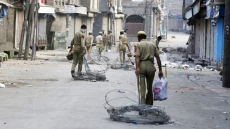Former British Prime Minister David Cameron, in his memoir "For the Record" released on Thursday, says that he got along well with his then Indian Prime Minister Manmohan Singh, who he describes as a "saintly man". Singh had confided in him after the July 2011 Mumbai coordinated bombings, that in case of another such attack, India would have to take military action against Pakistan.
According to extracts of the 752-page book, published by HarperCollins, Cameron says: "I got on well with PM Manmohan Singh. He was a saintly man, but he was robust on the threats India faced.
"On a later visit, he told me that another terrorist attack like that in Mumbai in July 2011 and India would have to take military action against Pakistan."
The July 2011 Mumbai bombings were a series of three coordinated explosions at different locations in Mumbai. The blasts occurred at the Opera House, at Zaveri Bazaar and at Dadar West localities, leaving 26 killed and 130 injured.
Cameron, who resigned in the wake of the 2016 Brexit referendum vote, makes several references about his "India doctrine" in the memoir.
"When it came to India, I argued that we needed a modern partnership - not one tinged with colonial guilt, but alive to the possibilities of the world's oldest democracy and the world's largest democracy," he writes.
Cameron, 52, was the prime minister in 2013 when UK ended its diplomatic boycott of the Narendra Modi government in Gujarat in the wake of the 2002 riots.
He later hosted PM Modi in November 2015 in a successful visit that saw him participate in the diaspora event at Wembley Stadium. He writes: "There were several 'moments', including the largest-ever gathering of the Indian diaspora in the UK at Wembley Stadium. Before introducing Modi, I told the 60,000-strong crowd that I envisaged a British-Indian entering 10 Downing Street as Prime Minister one day."
"The roar of approval was incredible. And as Modi and I hugged on stage, I hoped that this small gesture...would be a signal of the open-armed eagerness with which Britain approached the world."
On his visit to the Jallianwalla Bagh in Amritsar in 2013, becoming the first British PM to visit the site, he writes: "For a long time, friends and colleagues in the British Indian community had encouraged me to go to the Golden Temple in Amritsar."
".... No serving Prime Minister had ever been to Amritsar, let alone expressed regret for what happened (at Jallianwala Bagh).
"I wanted to change both those things, and would do so after the trade mission - the largest in UK history - I would lead to India in February 2013. Ahead of my visit there was an internal row about whether I should say 'sorry'.
"But ultimately, I felt that expressing regret for what I described in the memorial's book of condolence as 'a deeply shameful event in British history' was appropriate. I knew what it meant to British Sikhs that their Prime Minister had made that gesture, and I'm glad I did so."
On current British PM Boris Johnson, he writes that Boris "didn't believe" in Brexit, but backed the leave campaign to further his career. Johnson wanted to become the "darling of the party" and "didn't want to risk allowing someone else with a high profile - Michael Gove in particular - to win that crown", Cameron claims in the book.
"The conclusion I am left with is that he risked an outcome he didn't believe in because it would help his political career."
Cameron also claims that Johnson privately believed there should be a second referendum to confirm the terms of Brexit - something that Johnson has strongly resisted since. Cameron reveals that he tried to stop Johnson joining the Brexit campaign by offering him the post of Defence Secretary. Johnson, he says, believed the leave camp would lose, and if it did win, there could always be a fresh negotiation followed by a second referendum.
He also comes close to issuing an apology for the 2016 referendum.
Cameron writes he has no regrets about calling the referendum, saying it was "necessary" and "inevitable". But he says he is sorry about the divisions it has caused. He writes that he thinks about the consequences daily and worries "desperately" about what will happen.
Cameron claims he was disadvantaged in campaigning for the Remain faction. The referendum turned into a Conservative party psychodrama, he writes, and he was "hugely depressed" about leaving his post as Prime Minister. "I deeply regret the outcome and accept that my approach failed. The decisions I took contributed to that failure. I failed."

